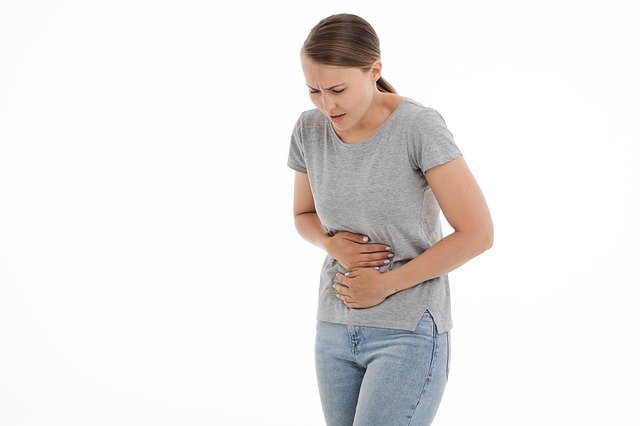
Ahhh, chickpeas. They’re one of the cheapest, healthiest, and most versatile foods on the planet – but unfortunately, they’re also one of the foods that’s most likely to cause you stomach issues.
Some people can eat chickpeas all day long and feel no ill effects, whereas others get bloating, cramping and gas every time they so much as glance at a chickpea. But why can chickpeas upset your stomach – and what can you do to prevent it?
Chickpeas usually cause stomach upset due to the oligosaccharides they contain, which can lead to gas build-up in the large intestine. The amount of gas produced can be reduced by thoroughly soaking the chickpeas before cooking, and the effects can also be mitigated by taking an enzyme supplement.
There are also several other possible reasons why chickpeas could be causing you stomach pain – let’s look at each cause in turn, and of course, how these stomach issues can be avoided!

Why do chickpeas cause stomach pain?
1. Chickpeas contain indigestible oligosaccharides
Chickpeas (along with lots of other foods, such as onions and garlic) contain sugars called oligosaccharides.
As you’ll know if you’ve ever been told to follow a ‘low-FODMAP’ diet, oligosaccharides are a type of sugar that our bodies can’t digest, along with the other sugars that make up the FODMAP accronym – fermentable oligosaccharides, disaccharides, monosaccharides and polyols.
I know this is beginning to read more like a chemistry textbook than a blog post, but luckily, you don’t need to understand the detailed chemistry; it’s enough to know that our bodies just don’t produce the enzymes required to break down these substances.
As a result, these sugars pass through to our large intestines without being broken down at all. Here, they begin to ferment (hence the F in FODMAP!), creating gas.
This gas collects in the large intestine, causing bloating, stomach cramps and discomfort, to varying degrees – some people might just suffer a small amount of gas after eating chickpeas (or even no ill effects at all), whereas unfortunately, other people may experience painful stomach cramps. The effects can be quite extreme in people with existing digestive issues, like irritable bowel syndrome.
2. Chickpeas are high in fibre
Chickpeas are very high in fibre, containing around 7.6 grams of fibre per 100g of cooked chickpeas (for reference, foods containing 6 grams or more, per 100g, are considered to be high fibre foods). As you may know, fibre is essentially indigestible plant matter.
Generally, fibre is a really good thing to have in our diets – it helps to keep us ‘regular’, so to speak. But, just like those pesky indigestible oligosaccharides, it can also cause gas.
For most people, eating a ‘normal’, non-excessive amount of fibre in our diets shouldn’t cause any intestinal issues. But if you find you’re having stomach pain after eating high fibre foods, you should consult your doctor for advice – it may be that you need to try to reduce the amount of fibre in your diet.

3. Chickpea allergies
Chickpeas aren’t a common cause of food allergies, but they are legumes, just like soy beans and peanuts, both of which are common triggers for allergic reactions.
Allergies are triggered by the immune system, rather than the digestive system, so may cause slightly different ill effects than the two issues we’ve already discussed. If you’re allergic to chickpeas, you may experience the same stomach cramps, bloating etc. that we’ve already mentioned, but you may also experience hives, itching around the mouth, and other allergy-like symptoms.
You should always see your doctor if you suspect you may have a chickpea allergy, as they will be able to advise on the best course of action to take. It may be that you simply need to stop eating chickpeas.
4. Contaminated chickpeas
And finally, just like with any other adverse food reaction, there’s always a chance that you simply have food poisoning from chickpeas that have been contaminated in some way. Perhaps they were stored incorrectly, or weren’t cooked properly.
Food poisoning is likely to cause symptoms like nausea, vomiting, stomach cramps, and fever. Make sure you consult your doctor if the symptoms continue for more than a couple of hours, and of course, don’t eat any more of the potentially contaminated chickpeas!
If you experience stomach upset every time you eat chickpeas, rather than just on one occasion, chances are it’s not simply food poisoning, and instead, your issues are caused by one of the first three items in this list.
How to prevent stomach pain after eating chickpeas
Unfortunately, if you’re suffering from a chickpea allergy, or stomach pains due to food poisoning, there’s not much you can do, other than just not eating (contaminated) chickpeas again.
But, if you think you may be suffering from an upset stomach due to some of the indigestible substances contained within chickpeas, there are certainly some steps you can take to reduce the bloating, gas, and other digestive issues you may experience.
Here are a few things you can try!

1. Thoroughly soak your chickpeas
The simplest way to reduce any digestive issues caused by eating chickpeas is to thoroughly soak them before cooking. Oligosaccharides are water soluble, so soaking can help your chickpeas to release this indigestible substance before they come anywhere near our digestive tracts.
One study (Njoumi, Amiot, Rochette, Bellagha & Mouquet-Rivier, 2019) found that soaking chickpeas actually reduced their oligosaccharide content by 40%! It was also helpful for reducing the oligosaccharides in lentils and fava beans, though to a lesser extent (more like 10%).
If it’s the oligosaccharides that causes your bloating after eating chickpeas, I can only imagine how much better you’d feel if your chickpeas contained 40% less of them.
If possible, soak your dried chickpeas overnight before cooking them – anything up to around 18 hours is perfect, and it’s even more helpful if you add some baking soda to the soaking water. Obviously you then need to discard the soaking water! Or, if you’re using canned chickpeas, rinse them thoroughly before using them, as this will wash away any gas-inducing substances that may have leached into the liquid in the can.
2. Take an enzyme supplement
As mentioned, a lot of the stomach upset that you may experience after eating chickpeas is caused by the indigestible oligosaccharides they contain. Our bodies can’t digest these sugars, because we don’t produce enough alpha-galactosidase, the enzyme that is necessary to break them down.
Therefore, taking a supplement that contains this enzyme can aid digestion, and may help relieve your digestive issues.
There are many over-the-counter supplements that contain alpha-galactosidase and claim to aid digestion, such as Beano, Bean Relief, Bean Assist, and more (the names of these products give a pretty big hint at what they’re designed for!). Since you don’t need a prescription to try these treatments, you can even buy them on Amazon.
There’s been limited research into the effectiveness of these supplements, but many people swear by them, and they do seem to be effective at reducing digestive discomfort for lots of people.
3. Eat smaller quantities of chickpeas
Just because you experience digestive issues after eating chickpeas, you don’t necessarily need to stop eating them altogether. It may be that simply reducing the quantity of chickpeas you eat is enough to reduce your stomach issues.
If eating 100g of chickpeas causes extreme bloating or stomach pain, chances are that eating 50g instead will cause significantly less pain.
So if you can’t bring yourself to stop eating your favourite legume altogether, try looking for recipes that will make a small amount of chickpeas go further, perhaps bulking them out with plenty of vegetables or grains.
This chickpea bolognese pasta bake, for example, uses just one can of chickpeas to feed 6 people, so you actually end up with quite a small amount of chickpeas on your plate, but they still make a great impact on the dish.
4. Try peppermint oil or peppermint tea
Peppermint has been shown to relieve uncomfortable digestive symptoms, such as gas and bloating. It relaxes your digestive system and eases cramping.
One study (Khanna, MacDonald & Levesque, 2014) found that peppermint oil is a safe short-term treatment to ease the digestive symptoms of IBS (irritable bowel syndrome), so it’s certainly worth trying if you suffer from gas or bloating after eating chickpeas.
Peppermint tea is another easy way to take peppermint – I was actually given peppermint tea in the hospital after I had both of my C-sections, as C-sections can cause painful gas.
As an added bonus, peppermint tea is delicious – much more enjoyable than most medical treatments – so even if you don’t find it helps your gas, you’ve at least had a nice drink!
Hopefully, if you experience uncomfortable gas or stomach bloating after eating chickpeas, one of the above tricks will work for you!
